16 Vitamins That are a Waste of Money, Say Experts

Americans spend an estimated $35 billion a year on dietary vitamins, but do they offer the health benefits consumers seek? That depends. Dr. Terrell Smith, MD, MPH, Founding Physician of Spora Health, a telehealth platform offering primary care for people of color, says, "A healthy and balanced diet will provide you with most of the vitamins that your body needs. Unless you are experiencing symptoms of vitamin deficiency and are advised by a healthcare provider to avoid taking excessive vitamins." Body Network talked to experts, explaining which vitamins are a waste of money and why. Read below to find out the 16 vitamins that Dr. Smith and Megan Mescher-Cox, DO Diplomate, American Board of Internal Medicine, Lifestyle Medicine and Obesity Medicine Identity Medical Group/Dignity Health Medical Group recommend leaving on the drugstore shelf.
1. Biotin
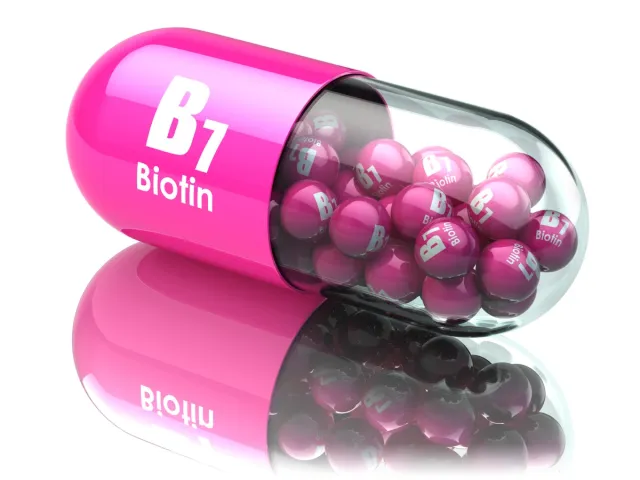
For anyone wanting to increase hair growth, Biotin is not the answer, says Dr. Smith. "Biotin, also known as vitamin H or vitamin B7, is an essential nutrient with many health benefits, including converting food to fuel and maintaining healthy skin, hair, and nails. While biotin is often touted as the key to luscious hair and strong nails, research has shown that is only true for people with underlying health conditions. Therefore, if you are healthy, there is no benefit in taking a biotin supplement. Biotin-containing hair products should provide any benefit to your hair health, so you need to add in oral supplementation unless you are advised by a healthcare provider."
2. Chromium
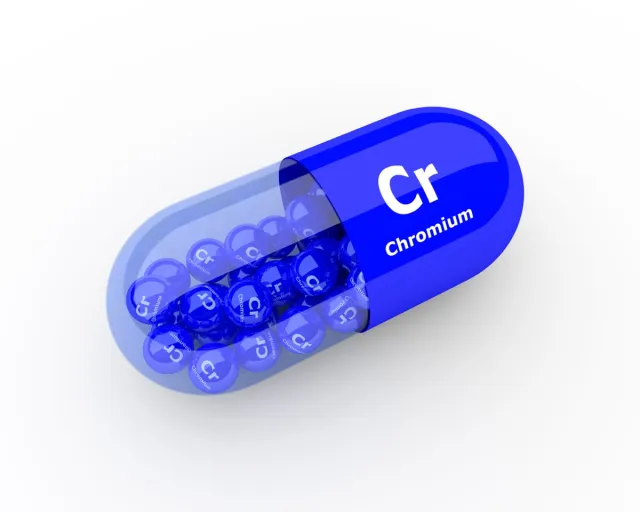
Another vitamin that's a waste of money, according to Dr. Smith, is chromium. "Known as an "essential trace element," this mineral is believed to help keep insulin levels steady. However, it's easily obtained in regular diets, so there's no need to go out of your way to buy and consume Chromium supplements. Sometimes, it's also sold online along with promises that it can help with weight loss, but there is no scientific evidence that backs up those claims, so definitely be leery of them."
3. Iron
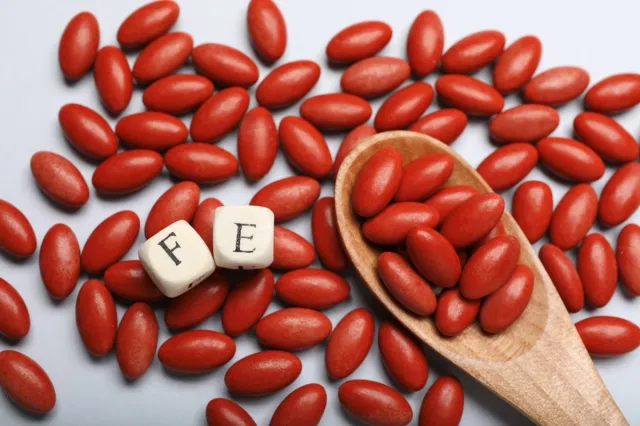
Iron is a vitamin many people take, but it might not have the health benefits you think. "Many people decide to take vitamin supplements thinking, "more is better." The truth is taking iron supplements without a confirmed deficiency from your doctor can be dangerous. Too much iron can cause irregular heartbeats, excessive buildup in the liver, and, in rare cases, can be cancerous! Good sources of iron can already be found in your diet, such as beans, dark chocolate, spinach, beef, and chicken."
4. Vitamin A
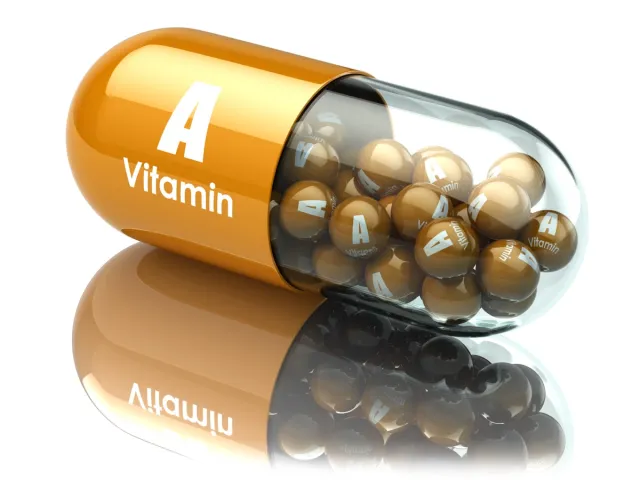
Don't take too much vitamin A, says Dr. Smith. "Vitamin A is an antioxidant and plays an important role in vision, but too much vitamin A can be toxic, causing multiple serious side effects. You should be able to get all the vitamin A you need from your diet (cheese, eggs, milk, yogurt, etc.). Any vitamin A your body does not need immediately is stored for future demands. This means you do not need it every day."
5. Vitamin B2 (Riboflavin)
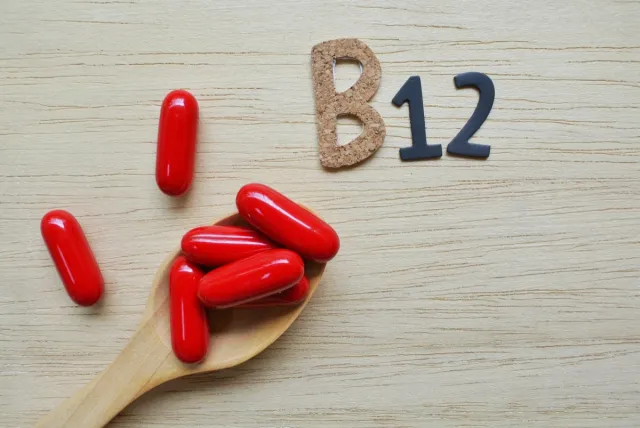
"Vitamin B2 is one of the eight essential B vitamins that your body needs to convert food (carbohydrates) into fuel (glucose), which is used to produce energy. It's commonly found in many of your favorite breakfast foods, like eggs, whole grain breads, milk, and yogurt. So, if you're already eating those regularly, supplementing with additional B2 vitamins is often unnecessary. In fact, your urine can turn neon yellow when you have too much Vitamin B2 in your system (it gets excreted vs being absorbed when levels are too high), so that's an easy way to see if you've gone overboard on the vitamin. As a side note, B vitamins are water-soluble, so excess can be processed and exposed in urine," Dr. Smith explains.
6. Vitamin B6
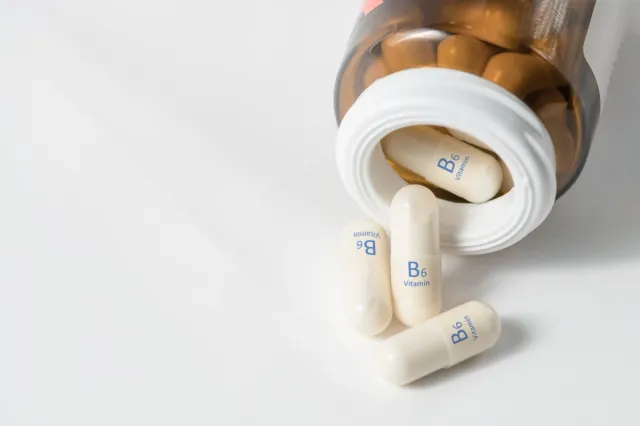
Dr. Smith says, "Another B-complex vitamin that is present in many foods – fruits, vegetables, whole grains, poultry and fish – that most of us get enough in our diets. Research shows that taking B6 supplements over a long period of time can actually cause serious health problems and high levels of B6 have been shown to cause abnormal nerve sensations/changes."
7. Vitamin D2
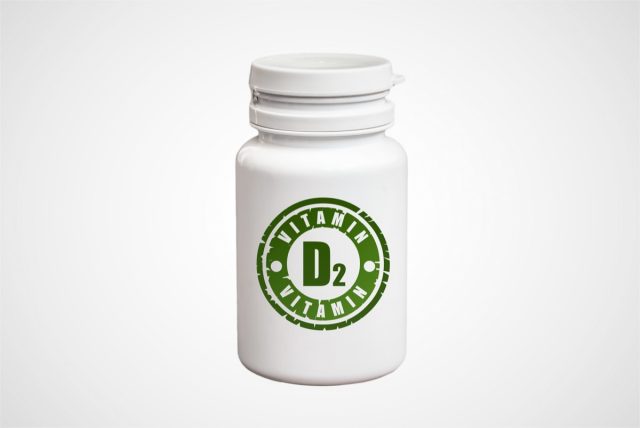
Get outside and enjoy the fresh air instead of spending money on vitamin D, Dr. Smith advises. "Vitamin D is essential for good health. It helps the body absorb the calcium it needs to build, maintain, and repair bones. It also plays a key role in muscle movement, the nervous system, and the immune system. Most of us get our vitamin D from sunshine. Vitamin D2 and vitamin D3 are the two main forms of vitamin D. Both play the same role in the body, but vitamins D2 and D3 have slightly different molecular structures. Vitamin D2 is made by plants, which your body does not absorb as efficiently. Research has shown that vitamin D3, which comes from animals, appears to be better at raising vitamin D levels, rendering a vitamin D2 supplement questionably useful."
8. Vitamin E
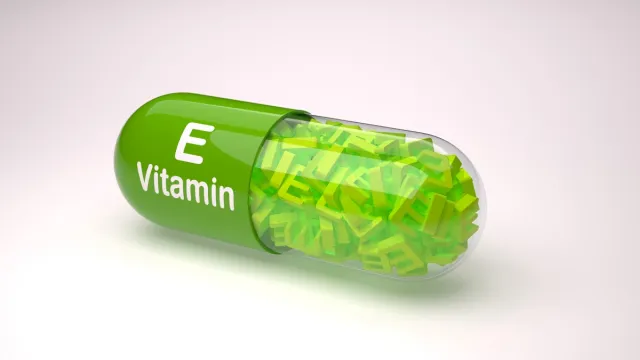
For anyone who wants to take vitamin E. Dr. Smith says, "Not many people are deficient in vitamin E, a fat-soluble vitamin that protects cells from damage and provides support for your immune system. Vitamin E is abundant in foods like avocado, almonds and spinach, making supplements unnecessary for most. Healthy adults need about 15 milligrams of the nutrient each day and overdoing this supplement could cause other issues, like hemorrhaging."
9. Red Yeast Rice
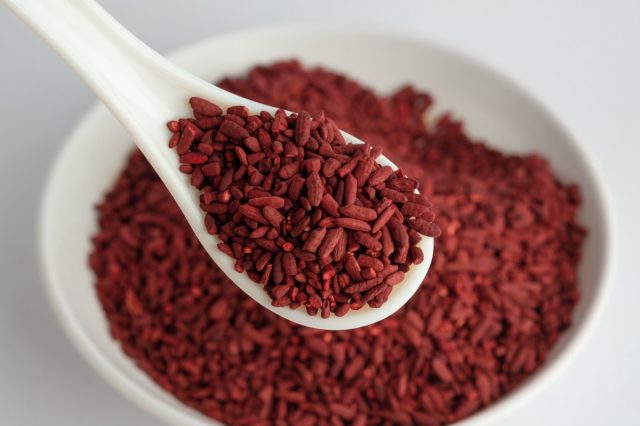
For anyone who wants to lower their cholesterol, Megan Mescher-Cox says, "Red yeast rice may lower cholesterol with its active ingredient Monacolin K. The largest problem with purchasing a supplement is the variability in the amount of active ingredients in the supplement. A study showed that some red yeast rice supplements actually contained no active ingredient at all. There has also been concern about contaminated citrin, which can cause liver failure. Instead of spending money on red yeast rice products, elevated cholesterol levels decrease quite significantly by increasing fiber-rich foods in their diet and decreasing or eliminating foods that contain cholesterol or saturated fat, which have the added benefits of also lowering blood pressure and sugar levels at the same time."
10. Gummy Vitamins
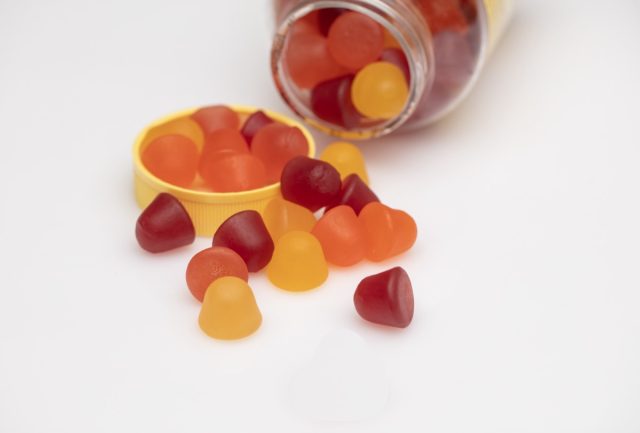
Why swallow a pill when you can chew a flavored gummy vitamin instead? Cox warns you to think twice about that. "When we consume anything, I'd recommend taking a look at the entire package. If someone is taking a specific vitamin for a medical reason, we want to make sure to get the vitamin. Sometimes, gummy vitamins contain inconsistent levels. Moreover, sugars, sugar substitutes, artificial colorings, or flavorings are often added, and these are known to be unhealthful."
11. Dehydroepiandrosterone, Known as DHEA
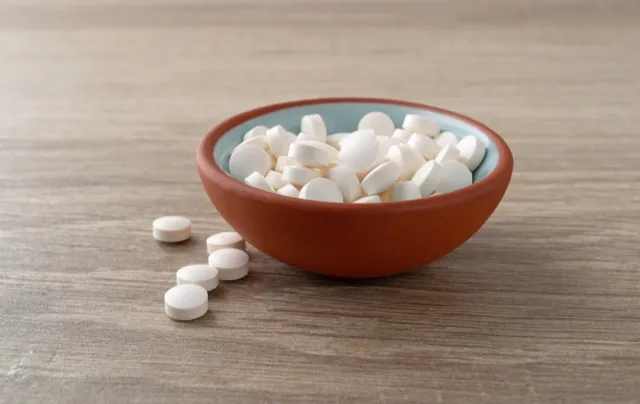
Who doesn't want to find the fountain of youth miracle in a vitamin, but no such thing exists? Cox explains, "I agree that DHEA is a waste of money for consumers and it comes with risks. It is a precursor to estrogen and testosterone. The side effect profile is poor and includes stunted growth, increase in blood pressure or cholesterol or mood swings. Additionally, there can be signs or symptoms of elevated testosterone in women, such as hair loss, voice changes, or growth of facial hair, or elevated estrogen in men: enlargement of breasts, shrinking of testicles, or lower sperm count. It can also have a negative effect on hormone-responsive cancers such as some breast, ovarian or prostate cancers. The long term safety of the supplements are not known without future studies. It should also be noted that it is banned in many sports organizations and even in countries as an anabolic steroid derivative. For a goal of youthfulness, the absolute best thing we can do is to get restful sleep ideally 7-9 hours nightly, minimizing stress and having ways to destress, and consuming a predominantly whole-foods, plant-based diet which is full of antioxidants while minimizing toxins including tobacco, alcohol, and processed foods."
12. Vitamin C For The Common Cold
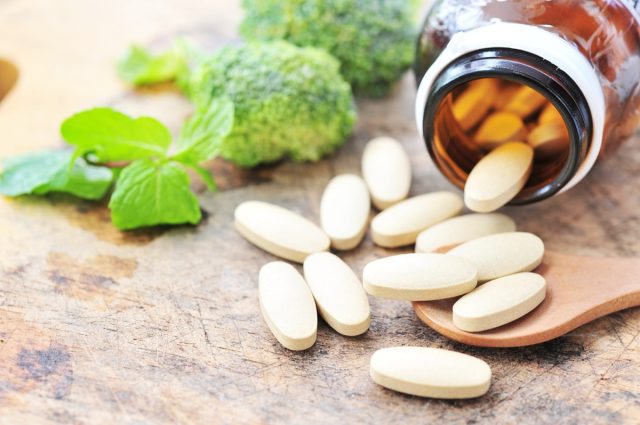
How often are you told to take vitamin C when you have a cold? But that's not actually good advice. Cox says, "Save your money on vitamin C for the common cold. There is no evidence that vitamin C supplementation reduces the risk or incidence of the common cold in the average person. As with other supplements, a healthy diet will get an adequate level of vitamin C. In fact, a medium orange daily will reach the recommended daily allowance (RDA) and will provide multiple added benefits to your health. Very high doses of vitamin C can lead to kidney stones, nausea and vomiting."
RELATED: 40 Health Symptoms That Are More Serious Than You Think
13. MCT Oil
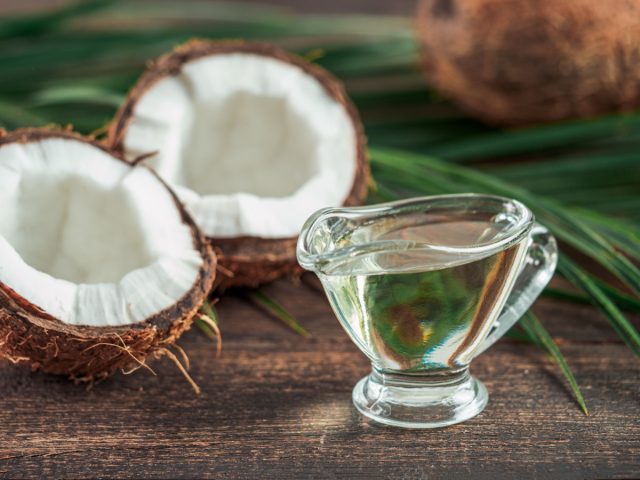
"MCT oil has become popular with the popularity of the ketogenic diet," Cox explains. "It is touted to increase the ketones and allow people to eat more vegetables and fruits while they are on the keto diet. The main risk of MCT oil comes from the fact that it is almost pure saturated fat. Saturated fat intake increases cholesterol levels and can cause fatty liver disease and coronary artery disease. It is not a healthful addition to the diet."
14. Hydroxymethylbutyrate (HMB)
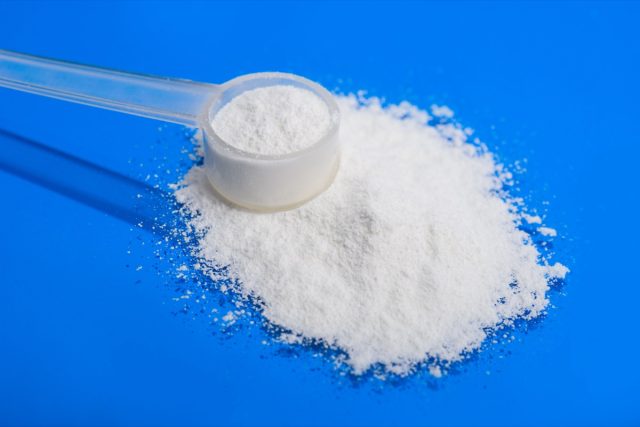
"HMB is a metabolite of the amino acid leucine and is found naturally in the body," Cox says. But, "It has not been proven to enhance athletic performance or decrease muscle soreness during exercise. Although no adverse effects have been identified from taking HMB, there are no benefits either."
15. L-arginine
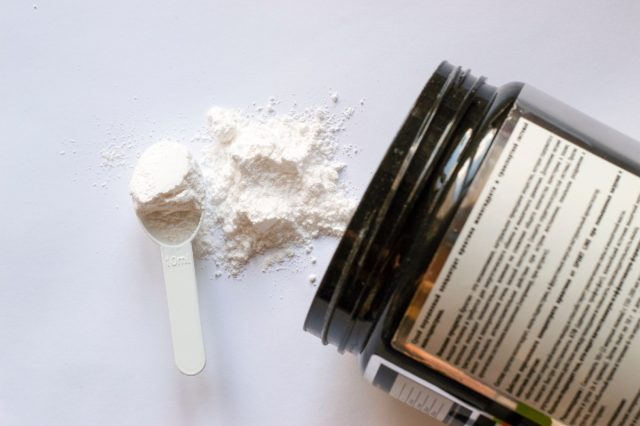
For men wanting a better erection, Cox says L-arginine isn't the vitamin to turn to. She states, "It is true that there is some use for men that have low levels of nitric oxide in their system but for the vast majority of Americans, L-arginine will have no effect. The beneficial nitric oxide actually comes from the very thin lining inside arteries called the endothelium. These endothelial cells secrete nitric oxide which acts on the nearby tissues and lasts a very short period of time, causing enlargement of the blood vessels and thereby increasing blood flow. The body is well designed and adapted to increase blood flow when needed but the endothelium can be damaged by high cholesterol, high blood pressure, high sugars (diabetes), high weight (obesity) and/or high stress. Taking L-arginine will not increase nitric oxide in the average person but lowering the chronic inflammation and damage to the endothelium can help. This can be done with a healthful diet, adequate rest and minimizing emotional stress."
16. Beta-Carotene
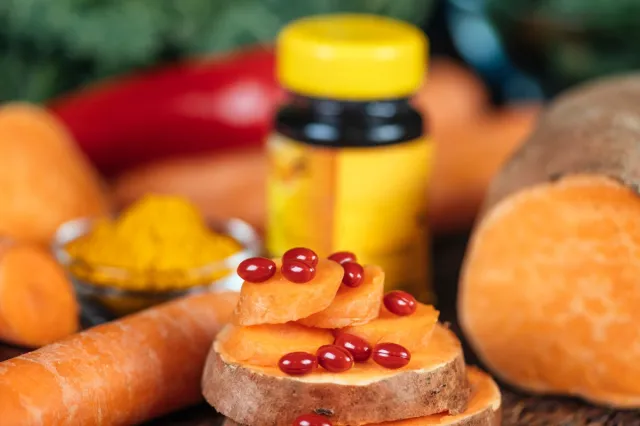
According to Cox, anyone who smokes should think twice about taking beta-carotene. "Beta-carotene is a carotenoid and a precursor to vitamin A. In its natural food form it is incredibly healthful but in the supplement form there have been studies that have associated beta-carotene intake with increased incidence of lung cancer in people that smoke or have had asbestos exposure." So buy your vitamins carefully.
💪🔥Body Booster: Eat a balanced diet with plenty of fruits, veggies, and whole foods. Your body gets most needed vitamins from nutritious meals. Only take vitamin supplements if prescribed by your doctor for a deficiency. Avoid excessive vitamins on your own. If you enjoyed this article, don't miss the 11 Supplements Everyone Should Prioritize, According to a Nutrition Expert.




